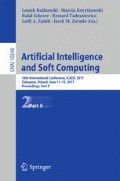Abstract
We investigate a machine learning approach to ontology instance matching. We apply syntactic and lexical text analysis as well as tensor-based data representation as means for feature engineering effectively supporting supervised learning based on logistic regression. We experimentally evaluate our approach in the scenario of the SABINE Data linking subtask defined by Ontology Alignment Evaluation Initiative. We show that, as far as the prediction of non-trivial matches is concerned, the use of the proposed tensor-based modelling of lexical and syntactical properties of the ontology instances enables achieving a significant quality improvement.
Access this chapter
Tax calculation will be finalised at checkout
Purchases are for personal use only
References
Achichi, M., et al.: Results of the ontology alignment evaluation initiative 2016. In: Proceedings of the 11th International Workshop on Ontology Matching, Kobe, Japan, 18 October 2016, pp. 73–129 (2016). http://ceur-ws.org/Vol-1766/oaei16_paper0.pdf
Balasubramani, B.S., Taheri, A., Cruz, I.F.: User involvement in ontology matching using an online active learning approach. In: Proceedings of the 10th International Workshop on Ontology Matching, Bethlehem, PA, USA, 12 October 2015, pp. 45–49 (2015). http://ceur-ws.org/Vol-1545/om2015_TSpaper3.pdf
Chapelle, O., Manavoglu, E., Rosales, R.: Simple and scalable response prediction for display advertising. ACM Trans. Intell. Syst. Technol. 5(4), 61:1–61:34 (2014)
Duan, S., Fokoue, A., Srinivas, K.: One size does not fit all: customizing ontology alignment using user feedback. In: Patel-Schneider, P.F., Pan, Y., Hitzler, P., Mika, P., Zhang, L., Pan, J.Z., Horrocks, I., Glimm, B. (eds.) ISWC 2010. LNCS, vol. 6496, pp. 177–192. Springer, Heidelberg (2010). doi:10.1007/978-3-642-17746-0_12
Faria, D., Pesquita, C., Balasubramani, B.S., Martins, C., Cardoso, J., Curado, H., Couto, F., Cruz, I.: OAEI 2016 results of AML. In: Proceedings of the 11th International Workshop on Ontology Matching, Kobe, Japan, 18 October 2016, pp. 138–145 (2016). http://ceur-ws.org/Vol-1766/oaei16_paper2.pdf
Gondek, D.C., Lally, A., Kalyanpur, A., Murdock, J.W., Duboue, P.A., Zhang, L., Pan, Y., Qiu, Z.M., Welty, C.: A framework for merging and ranking of answers in DeepQA. IBM J. Res. Dev. 56(3), 399–410 (2012)
Johnson, E., Baughman, W.C., Ozsoyoglu, G.: Mixing domain rules with machine learning for radiology text classification. In: Proceedings of the ACM SIGKDD Workshop on Health Informatics (HI-KDD 2014) (2014)
Langford, J., Li, L., Zhang, T.: Sparse online learning via truncated gradient. J. Mach. Learn. Res. 10, 777–801 (2009)
Mao, M., Peng, Y., Spring, M.: Ontology mapping: as a binary classification problem. Concurr. Comput. Pract. Exp. 23(9), 1010–1025 (2011)
Nickel, M., Tresp, V.: An analysis of tensor models for learning on structured data. In: Blockeel, H., Kersting, K., Nijssen, S., Železný, F. (eds.) ECML PKDD 2013. LNCS, vol. 8189, pp. 272–287. Springer, Heidelberg (2013). doi:10.1007/978-3-642-40991-2_18
Ontology Alignment Evaluation Initiative: OAEI 2016: Instance Matching Track (2016). http://islab.di.unimi.it/content/im_oaei/2016
Ontology Alignment Evaluation Initiative: Ontology Alignment Evaluation Initiative - OAEI 2016 Campaign (2016). http://oaei.ontologymatching.org/2016/
Otero-Cerdeira, L., Rodríguez-Martínez, F.J., Gómez-Rodríguez, A.: Ontology matching: a literature review. Expert Syst. Appl. 42(2), 949–971 (2015)
Shvaiko, P., Euzenat, J.: Ontology matching: state of the art and future challenges. IEEE Trans. Knowl. Data Eng. 25(1), 158–176 (2013)
Szwabe, A., Misiorek, P., Ciesielczyk, M.: Tensor-based modeling of temporal features for big data CTR estimation. In: Kozielski, S., Mrozek, D., Kasprowski, P., Małysiak-Mrozek, B., Kostrzewa, D. (eds.) BDAS 2017. CCIS, vol. 716, pp. 16–27. Springer International Publishing, Cham (2017). doi:10.1007/978-3-319-58274-0_2
Szwabe, A., Misiorek, P., Walkowiak, P.: Reflective relational learning for ontology alignment. In: Omatu, S., De Paz Santana, J., González, S., Molina, J., Bernardos, A., Rodríguez, J. (eds.) Distributed Computing and Artificial Intelligence. AISC, vol. 151, pp. 519–526. Springer, Heidelberg (2012). doi:10.1007/978-3-642-28765-7_62
Szwabe, A., Misiorek, P., Walkowiak, P.: Tensor-based relational learning for ontology matching. In: Advances in Knowledge-Based and Intelligent Information and Engineering Systems - 16th Annual KES Conference, San Sebastian, Spain, 10–12 September 2012, pp. 509–518 (2012)
The Stanford Natural Language Processing Group: The Stanford Parser. http://nlp.stanford.edu/software/lex-parser.shtml
Zhang, L., Yang, J., Chu, W., Tseng, B.: A machine-learned proactive moderation system for auction fraud detection. In: Proceedings of the 20th ACM International Conference on Information and Knowledge Management, CIKM 2011, pp. 2501–2504. ACM, New York (2011)
Zhang, Y., Jin, H., Pan, L., Li, J.: RiMOM results for OAEI 2016. In: Proceedings of the 11th International Workshop on Ontology Matching, Kobe, Japan, 18 October 2016, pp. 210–216 (2016). http://ceur-ws.org/Vol-1766/oaei16_paper13.pdf
Acknowledgments
This work is supported by the Polish National Science Centre, grant DEC-2011/01/D/ST6/06788.
Author information
Authors and Affiliations
Corresponding author
Editor information
Editors and Affiliations
Rights and permissions
Copyright information
© 2017 Springer International Publishing AG
About this paper
Cite this paper
Szwabe, A., Misiorek, P., Bąk, J., Ciesielczyk, M. (2017). Tensor-Based Syntactic Feature Engineering for Ontology Instance Matching. In: Rutkowski, L., Korytkowski, M., Scherer, R., Tadeusiewicz, R., Zadeh, L., Zurada, J. (eds) Artificial Intelligence and Soft Computing. ICAISC 2017. Lecture Notes in Computer Science(), vol 10246. Springer, Cham. https://doi.org/10.1007/978-3-319-59060-8_55
Download citation
DOI: https://doi.org/10.1007/978-3-319-59060-8_55
Published:
Publisher Name: Springer, Cham
Print ISBN: 978-3-319-59059-2
Online ISBN: 978-3-319-59060-8
eBook Packages: Computer ScienceComputer Science (R0)

